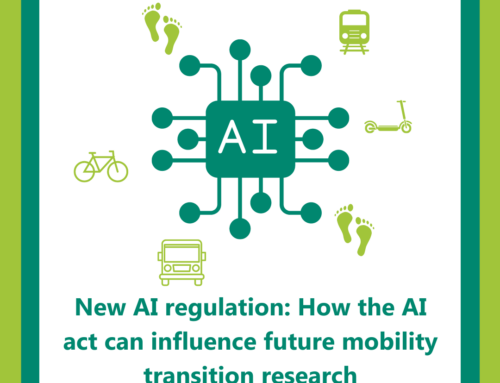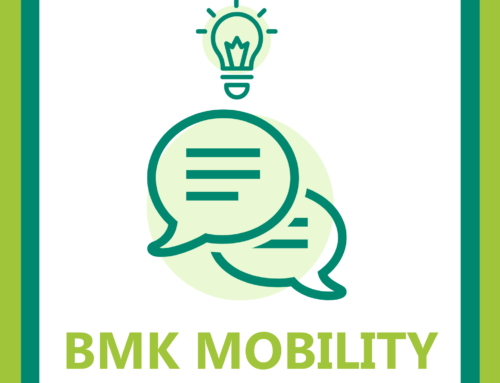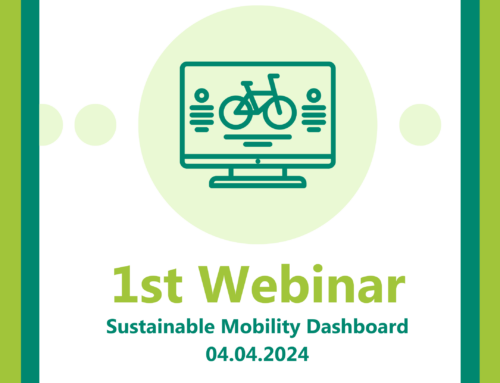The AI-CENTIVE project has marked significant progress in its first year. The following list is just a short summary of relevant contributions, the project partners delivered since the AI-CENTIVE start.
MODUL Technology, webLyzard technology, Geosphere Austria, ummadum, and BOKU University play a vital role in shaping the future of sustainable mobility and this collaborative effort aims to incentivize greener transport means. All of this with the help of AI and data-driven approaches. DIO has an honour to communicate about the progress and disseminate information about the project.
 In its first year of the AI-CENTIVE project, MODUL Technology has made significant strides in advancing the field of sustainable mobility through innovative technology and data analysis. Their achievements can be summarized as follows:
In its first year of the AI-CENTIVE project, MODUL Technology has made significant strides in advancing the field of sustainable mobility through innovative technology and data analysis. Their achievements can be summarized as follows:
1. Development of the Mobility Knowledge Graph: MODUL Technology has successfully established a comprehensive Mobility Knowledge Graph, a sophisticated digital platform that encapsulates domain-specific knowledge about sustainable mobility. This graph is meticulously structured, encompassing various entities such as Persons, Organizations, Locations, and Events, with a particular emphasis on enhancing the understanding of mobility dynamics within Austria. A standout feature of this initiative is the ‘automated knowledge graph completion’ pipeline. This advanced system is an adept at scouring through a myriad of sources, particularly Austrian news and mobility communications, to identify and integrate previously unrecognized entities into the knowledge graph. This process not only enriches the graph with new data but also ensures its continuous evolution and relevance.
2. AI-based Prediction Model for Mobility Choice: Another remarkable achievement is the development of an AI-powered prediction model tailored to forecast future mobility patterns in Austria. This deep learning model, built in collaboration with ummadum, leverages anonymized data to predict various aspects of future trips. It can accurately forecast the mode of transportation—be it walking, biking, driving, or public transport—the distance, and even the destination region of a trip. The model’s predictive capabilities are grounded in its ability to learn from historical trip patterns. Such foresight is invaluable, as it provides insights into future mobility behaviour, enabling the formulation of targeted strategies to promote sustainable transportation choices. By anticipating people’s mobility preferences, the model aids in designing and implementing effective incentives that can steer public behaviour towards more environmentally friendly travel options.
Overall, MODUL Technology’s contributions to the AI-CENTIVE project in its inaugural year have been monumental. They have not only advanced the understanding of sustainable mobility in Austria, but also set a benchmark for integrating AI and data analytics in addressing critical environmental challenges. As the project progresses, these innovations are expected to significantly influence the way we approach and manage mobility for a more sustainable future.
 In addition to MODUL Technology’s impressive achievements in the AI-CENTIVE project, webLyzard technology has also made significant steps in the project’s first year, further bolstering the initiative’s impact on sustainable mobility. The key accomplishment is the development of the AI-CENTIVE Dashboard, a cutting-edge tool designed for in-depth analysis and visualization of mobility-related information. This dashboard represents a major leap forward in understanding and influencing public perceptions of mobility.
In addition to MODUL Technology’s impressive achievements in the AI-CENTIVE project, webLyzard technology has also made significant steps in the project’s first year, further bolstering the initiative’s impact on sustainable mobility. The key accomplishment is the development of the AI-CENTIVE Dashboard, a cutting-edge tool designed for in-depth analysis and visualization of mobility-related information. This dashboard represents a major leap forward in understanding and influencing public perceptions of mobility.
The AI-CENTIVE Dashboard: The initial prototype of the AI-CENTIVE Dashboard is a testament to webLyzard’s expertise in digital innovation. This visual exploration system is crafted to analyse the nuances of mobility-related coverage in public discourse and stakeholder communications. What sets this dashboard apart is its ability to encapsulate and visualize vast amounts of data on mobility, providing clear and actionable insights.
The dashboard effectively captures the public debate surrounding mobility choices, highlighting how different modes of transport are perceived by the general populace. This feature is crucial, as public perception plays a pivotal role in the adoption of sustainable mobility practices. By closely monitoring and analysing these perceptions, the dashboard aids in identifying prevailing attitudes, misconceptions, and potential areas of resistance that could be addressed through targeted communication strategies.
Furthermore, the dashboard is instrumental in evaluating the impact of awareness campaigns. By tracking changes in public discourse and sentiment before and after such campaigns, it provides a clear indication of their effectiveness. This functionality is invaluable for stakeholders aiming to promote sustainable mobility, as it enables them to fine-tune their strategies and messaging for maximum impact.
The AI-CENTIVE Dashboard by webLyzard is more than just a data visualization tool; it is a strategic asset in the quest to shift public behaviour towards more sustainable mobility choices. By offering deep insights into public opinion and the efficacy of awareness campaigns, it empowers policymakers, campaign designers, and mobility stakeholders to make informed decisions that can lead to a more sustainable and environmentally conscious transportation ecosystem.
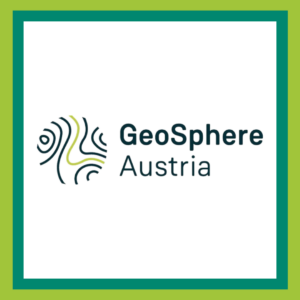 Geosphere Austria has also made significant contributions in its first year, particularly in the realm of weather data and forecasting. These advancements are crucial for the project’s overall goal of promoting sustainable mobility, as they provide essential insights for the effective implementation of the incentivisation pilot.
Geosphere Austria has also made significant contributions in its first year, particularly in the realm of weather data and forecasting. These advancements are crucial for the project’s overall goal of promoting sustainable mobility, as they provide essential insights for the effective implementation of the incentivisation pilot.
Weather Data and Forecasting: A key milestone achieved by Geosphere Austria is the near completion of the extraction process for essential weather data. This data is fundamental to the AI-CENTIVE project, especially for the incentivisation pilot, as it plays a critical role in understanding and predicting mobility patterns. Weather conditions significantly influence how individuals choose to travel, and having accurate, detailed data is vital for developing models that can anticipate these choices.
In addition to data extraction, Geosphere Austria has successfully finalized the architecture of a machine learning-based forecasting system. This system represents a significant technological advancement in predictive analytics, particularly in the context of sustainable mobility. The forecasting system is designed to not only gather and analyse current weather data, but also to predict future weather conditions with high accuracy. This capability is essential for anticipating how weather changes might impact mobility choices and for adjusting incentivisation strategies accordingly.
The ongoing work involves rigorous testing and refinement of the predictive models. These test runs are crucial for ensuring the reliability and accuracy of the forecasts. By continually refining the models, Geosphere Austria aims to enhance their predictive capabilities, making them more adept at forecasting a range of weather scenarios and their potential impact on mobility.
Geosphere Austria’s work in weather data extraction and forecasting is a pivotal component of the AI-CENTIVE project. By providing accurate and timely weather information and predictions, they are enabling more effective planning and implementation of strategies aimed at encouraging sustainable mobility choices.
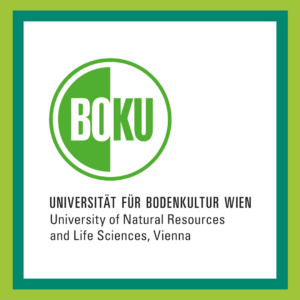 BOKU University’s involvement in the AI-CENTIVE project has been pivotal, particularly in the context of the ummadum pilot study. Their approach has been methodical and data-driven, focusing on understanding travel behaviours across diverse socio-economic groups.
BOKU University’s involvement in the AI-CENTIVE project has been pivotal, particularly in the context of the ummadum pilot study. Their approach has been methodical and data-driven, focusing on understanding travel behaviours across diverse socio-economic groups.
BOKU University has developed a set of indicators to be collected during the ummadum pilot study. These indicators are essential for eliciting detailed information on the nuances of travel behaviour within various socio-economic groups. Understanding these nuances is crucial for tailoring mobility solutions to fit the needs and preferences of different segments of the population. The indicators are specifically chosen to account for the heterogeneity in mode choices among ummadum application users. By analysing these choices both during and prior to the pilot study (baseline behaviour), BOKU University aims to identify patterns and shifts in travel behaviour, offering valuable insights into how incentives and other interventions might influence mobility decisions.
The study involves comparing two datasets – baseline and pilot survey – to trace changes in travel behaviour among ummadum application users. This comparative analysis is crucial for understanding the impact of the pilot study on participants’ travel choices. A key aspect of the study is tracking the vehicle kilometres travelled (VKT) to determine the modes of transport used. This data is instrumental in assessing the environmental impact of travel choices. Moreover, CO2 emissions will be estimated using a CO2 calculator, which serves as a critical indicator of the efficiency of AI-based incentives in promoting more environmentally friendly travel options.

The AI-CENTIVE project, set to launch its pilot phase in 2024, marks a significant milestone in promoting sustainable mobility. Hosted on the ummadum platform, this pilot represents a pioneering effort to integrate AI technology into everyday travel choices, making it a standout initiative in urban transportation.
The pilot is designed to be openly accessible, allowing anyone to participate. This inclusivity is crucial in encouraging widespread adoption of sustainable travel practices.
A core feature of the pilot is the use of AI to provide incentives for sustainable mobility choices. These incentives are aimed at rewarding users for opting for environmentally friendly modes of transport, thereby promoting a shift in travel behavior towards sustainability. Extensive preparations are underway to ensure the smooth operation of the pilot. This includes setting up systems for the efficient delivery of incentives to users, which is essential for maintaining engagement and trust. Robust data pipelines are being established to collect and analyze mobility data. This is crucial for the AI system to accurately understand and respond to user behavior, and for refining incentive mechanisms based on real-world data.
Efforts are being made to build a community around the pilot, fostering a sense of collective participation and purpose. Additionally, rewarding schemes are being developed and fine-tuned to maximize appeal and effectiveness.

